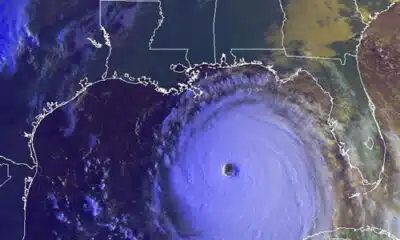News from the South - Louisiana News Feed
Former Trump attorney confirmed by Senate as federal appeals judge, despite misconduct complaints
by Ashley Murray, Louisiana Illuminator
July 30, 2025
WASHINGTON — The U.S. Senate on Tuesday night confirmed President Donald Trump’s former criminal defense attorney, Emil Bove, to a lifetime position on the federal appeals bench, in the face of whistleblower allegations and criticism from former judges and advocates.
Republican Sens. Lisa Murkowski of Alaska and Susan Collins of Maine broke with their party and joined all Democrats in a 50-49 vote to oppose Bove’s confirmation to the U.S. Appeals Court for the 3rd Circuit, which handles cases for Delaware, New Jersey, Pennsylvania and the U.S. Virgin Islands.
Bove, 44, currently holds the position of principal associate deputy attorney general at the U.S. Justice Department. Trump initially appointed Bove as acting attorney general at the start of the president’s second term.
The former federal prosecutor and private defense attorney faced numerous accusations of misconduct throughout his confirmation process.
Democrats walked out of a July 17 committee vote to advance Bove’s nomination, largely protesting the GOP-led panel’s refusal to hear further testimony from a whistleblower who alleged Bove suggested defying a federal court order.
Longtime Justice Department senior official Erez Reuveni, who served in the first Trump administration, blew the whistle on Bove for a March 14 meeting during which he allegedly suggested subordinates tell the federal courts “f— you” if a judge ordered a halt to Trump’s deportation flights to El Salvador. A second whistleblower corroborated the alleged comment, according to a CNN report Sunday.
Senate Democrats, former judges and advocates also voiced concern over Bove’s alleged unethical behavior, including questions about his role as a top Justice official in the dismissal of federal bribery charges against New York City Mayor Eric Adams and in the firing of prosecutors who worked on cases probing the Jan. 6, 2021, storming of the U.S. Capitol.
Bove has denied any wrongdoing.
Critics also pointed to a trail of allegations from Bove’s former colleagues in the U.S. attorney’s office for the Southern District of New York that he created a hostile work environment, as first reported by Politico in February.
‘Unfair accusations and abuse’
On Monday, the Washington Post reported that a third whistleblower had come forward, this time alleging the top Justice Department office misled the Senate Committee on the Judiciary in testimony regarding the dropped charges against Adams.
Sen. Chuck Grassley, who chairs the committee tasked with vetting judicial nominees, said on the floor ahead of the vote that Democrats “grossly mischaracterized” allegations against Bove.
“I have serious concerns with how my Democratic colleagues have conducted themselves — the vicious rhetoric, unfair accusations and abuse directed at Mr. Bove,” the Iowa Republican said.
Grassley said he asked Bove to put in writing his response to the latest whistleblower accusations.
“In his letter, Mr. Bove flatly denies the allegations that he misled the committee,” Grassley said.
In the seven-page letter made public by Grassley Tuesday evening, Bove dismissed the accusations as a “partisan smear campaign” and a “sham.”
“I understand that a lifetime appointment to a federal court of appeals is a serious matter. I welcome serious scrutiny of my record and my service to this country. My record includes 32 appeals, 13 trials, nearly a decade as a federal prosecutor, clerkships in federal trial and appellate courts, successfully defending the President of the United States, and helping lead the Department of Justice,” Bove wrote.
“Principled evaluation of that record, separated from the raw political warfare by Democrats that has tainted this process, confirms that I will be a fearless, independent judge committed to justice and the rule of law,” he continued.
‘So wrong, so unusual’
Senate Democrats railed against the nomination Tuesday.
Sen. Sheldon Whitehouse, a member of the Senate Judiciary Committee, said ahead of the vote the allegations against Bove “were not minor episodes of prosecutorial misconduct.”
“What we’re about to do is so wrong, so unusual, that even if these remarks will have no effect whatsoever, I feel obliged to come to the floor,” the Rhode Island lawmaker said.
Sen. Dick Durbin, the top Democrat on the Judiciary Committee, wrote in a social media post that “Three credible whistleblowers have come forward with serious allegations against Emil Bove, a Trump judicial nominee. Republicans are ignoring them and rushing to confirm Bove anyway.”
“They’re afraid of the truth… and Donald Trump’s wrath. Shameful,” Durbin, of Illinois, continued.
In a statement issued Tuesday afternoon by the Not Above the Law Coalition, the organization’s leaders said Bove is “unfit for a lifetime appointment to the federal bench.”
“His record of misconduct and disdain for the rule of law is a direct threat to judicial independence and Americans’ rights and freedoms. Any senator who votes to confirm Bove is making clear that their loyalty lies with Donald Trump, not the people they serve or the Constitution they swore to uphold,” the statement continued from the coalition’s co-chairs, including Lisa Gilbert, co-president of Public Citizen; Praveen Fernandes, vice president of the Constitutional Accountability Center; Kelsey Herbert, campaign director at MoveOn; and Brett Edkins, managing director for policy and political affairs at Stand Up America.
Last updated 10:25 a.m., Jul. 30, 2025
Louisiana Illuminator is part of States Newsroom, a nonprofit news network supported by grants and a coalition of donors as a 501c(3) public charity. Louisiana Illuminator maintains editorial independence. Contact Editor Greg LaRose for questions: info@lailluminator.com.
The post Former Trump attorney confirmed by Senate as federal appeals judge, despite misconduct complaints appeared first on lailluminator.com
Note: The following A.I. based commentary is not part of the original article, reproduced above, but is offered in the hopes that it will promote greater media literacy and critical thinking, by making any potential bias more visible to the reader –Staff Editor.
Political Bias Rating: Center-Left
The content displays a Center-Left bias as it focuses heavily on the accusations and concerns raised predominantly by Democratic politicians, former judges, and advocacy groups, highlighting serious allegations against Emil Bove, a nominee appointed by former President Donald Trump. The article provides substantial space to criticism from Democrats and whistleblowers, while also including Republican counterpoints but portraying them less favorably. The framing emphasizes perceived misconduct and ethical issues linked to a Trump nominee, a narrative commonly found in center-left media coverage. However, the article balances this with responses from Republicans and Bove’s denials, avoiding a strictly partisan tone.
News from the South - Louisiana News Feed
One way to help local musicians? Pay them to tour. – The Current
SUMMARY: Marcella Simien, a Lafayette native and daughter of zydeco legend Terrance Simien, tours as a Memphis brand ambassador supported by Music Export Memphis, a nonprofit aiding local musicians. Since 2018, Music Export has granted over $170,000 in 2024 alone to help artists tour beyond Memphis, promoting the city while sustaining musicians financially. The program offers grants, business training, and industry exposure, aiming to retain talent locally amid economic challenges and declining venues. Founder Elizabeth Cawein emphasizes music as a sustainable export that benefits the community. Simien credits the support for her career growth, international opportunities, and strong Memphis ties.
Read the full article
The post One way to help local musicians? Pay them to tour. – The Current appeared first on thecurrentla.com
News from the South - Louisiana News Feed
Remembering 20 years after Hurricane Katrina
SUMMARY: On August 29, 2005, Hurricane Katrina struck Louisiana as a Category 3 storm with 125 mph winds, making landfall in Plaquemines Parish. It became the third most intense U.S. landfalling hurricane, causing massive devastation and loss of life, with impacts still felt 20 years later. Across New Orleans, Jefferson, St. Tammany, St. Charles, Plaquemines, and St. Bernard Parishes, officials and first responders reflected on the tragedy, honoring resilience, sacrifice, and ongoing recovery efforts. Leaders emphasized remembrance, community strength, and commitment to building safer, stronger futures while mourning those lost and celebrating the courage of survivors.
Read the full article
The post Remembering 20 years after Hurricane Katrina appeared first on wgno.com
News from the South - Louisiana News Feed
K+20: Katrina showed how crucial federal funding is after a disaster. How much will remain?
by Julie O’Donoghue, Louisiana Illuminator
August 29, 2025
For years after Hurricane Katrina, New Orleanians made the Federal Emergency Management Agency the butt of their bitter jokes.
Anti-FEMA sentiment was so high in Louisiana that local businesses started selling T-shirts a couple of months after the storm lampooning the federal agency with slogans like “Where’s FEMA?” and “FEMA stands for Federal Employees Missing in Action”.
The sentiment is understandable. Almost a half dozen federal investigations launched in the six months after Hurricane Katrina made landfall Aug. 29, 2005 – and turned into the country’s most catastrophic natural disaster – determined FEMA failed in nearly every way to respond to the storm.
“Hurricane Katrina exposed flaws in the structure of FEMA and DHS that are too substantial to mend,” concluded a 2006 U.S. Senate report titled “Hurricane Katrina: A Nation Still Unprepared.”
Yet 20 years after the agency’s feckless Katrina response, some Louisiana leaders find themselves in the awkward position of having to defend FEMA.
President Donald Trump has made it clear he wants the federal government to play less of a role in natural disaster response, raising concerns that state and local governments might need to cover more of their recovery costs.
Such a change would likely affect Louisiana more than almost every other state in the country.
Since Katrina, Louisiana has received more public and individual assistance from FEMA ($12.6 billion) than all states but Florida ($16.6 billion) and New York ($19.4 billion), according to the Carnegie Endowment for International Peace, which tracks federal disaster spending.
The money helped Louisiana respond to 25 extreme weather events, including 11 hurricanes, six floods and one ice storm, over the past two decades.
That FEMA figure doesn’t account for all of the money Louisiana has received in the wake of Katrina. There was another $11 billion from the U.S. Department of Housing and Urban Development went to the Road Home program to rebuild housing. All told, the federal government put an unprecedented $76 billion toward Louisiana’s recovery from the 2005 storm.
Louisiana simply wouldn’t be able to handle the financial burden of major disaster response without significant support from the federal government, according to several former state officials interviewed. Storms with far less impact than Katrina have the ability to overwhelm the state’s assets, they said.
If Louisiana has to worry about covering more disaster recovery costs, the state will have less money to spend on schools, universities, roads, bridges and economic development.
“If we didn’t have the federal money, we would be in a terrible mess, and we would have been in a terrible mess from Katrina going forward,” said Jay Dardenne, Louisiana’s former lieutenant governor and state budget chief for former Gov. John Bel Edwards.
Uncertainty at FEMA
To what extent Trump will pull back on federal disaster assistance isn’t clear.
As recently as June, the president said he would push to eliminate FEMA altogether. He then backed off that rhetoric after July 4th weekend flooding in Texas killed at least 136 people, including children attending a sleepaway camp. His administration’s response was directly criticized.
Still, the Trump administration has already made several preliminary changes to FEMA that alarm emergency response experts. The agency has reduced staff and some of those who remain have been asked to help with hiring immigration enforcement agents instead of working on disaster relief.
The FEMA cuts come on top of those to the National Hurricane Center and other federal programs that provide crucial information to hurricane-prone states and help them ready for incoming storms.
Some reforms Congress enacted in the year after Katrina to strengthen FEMA have also been ignored. A law requiring FEMA’s director to have experience in emergency response and disaster recovery isn’t being followed. Trump’s acting FEMA administrator David Richardson previously oversaw counter terrorism programs but does not have natural disaster management experience.
There are also concerns about whether a new policy delayed assistance during the Texas flood, similar to what unfolded in the aftermath of Katrina.
Due to a bureaucratic breakdown 20 years ago, FEMA failed to promptly provide boats for search-and-rescue teams in New Orleans, even after federal officials knew flooding was widespread, according to a U.S. Senate report from 2006.
This past July, several questions were raised about whether search-and-rescue teams were delayed during the Texas flood because Homeland Security Secretary Kristi Noem now requires every FEMA contract over $100,000 to be approved personally by her, the Associated Press reported. The Trump administration has denied those allegations.
The ability of Louisiana and other states to respond to catastrophic weather with their own staff would also likely be impacted if Trump changes the traditional funding reimbursements for recovery efforts.
“The federal government will have a lasting role in responding to and funding the impact of disasters; local and state governments simply do not have the resources to do so,” said Paul Rainwater, who was executive director of the Louisiana Recovery Authority that managed federal funding for state rebuilding efforts after Hurricane Katrina. He went on to serve as former Gov. Bobby Jindal’s chief of staff and budget czar.
“The question the Trump administration faces, given some of its comments about FEMA, is: When will a White House step in and help?” he said.
Presidential discretion
The president has a significant say in when FEMA provides funding to states after natural disasters, as well as how much money states or local governments receive.
When a state is overwhelmed by a catastrophic event, a governor makes a formal request of the president for federal assistance. FEMA starts to provide help to the state authorities after it is granted.
Since returning to office in January, Trump has denied disaster relief that was expected to be approved. His decisions have affected liberal-leaning states such as Maryland and Washington and more conservative ones like West Virginia.
He even stalled for a month on accepting a disaster declaration from Arkansas Gov. Sarah Huckabee Sanders, who personally knows Trump and served as his press secretary during his first term as president.
As president, Trump has the ability to not only approve federal assistance, but to also increase the share of the state or local costs that FEMA will reimburse. For example, federal law gives presidents the discretion to reduce or waive the requirement for a state or local government to cover 25% of the cost of debris removal after a storm.
Louisiana has benefited from a reduction of these local financial responsibilities for nine weather events in the past 25 years, including for hurricanes Ida (2021), Laura (2020), Ike (2008), Gustav (2008), Rita (2005), Katrina (2005) and Ivan (2004). The 2016 Baton Rouge-area floods and a severe ice storm in 2001 were also approved for enhanced federal assistance, according to a 2023 Congressional report.
But all the upheaval should be a signal to local and state officials to prepare as if that extra FEMA help might not be coming their way, former FEMA administrator Deanne Criswell, who worked for President Joe Biden, said in a call with reporters this week.
“There are, right now, a lot of questions about whether any of those costs are going to be eligible for reimbursement,” Criswell said. “You need to put plans in place to make sure that you can do it, regardless of whether you get federal support.”
U.S. Sen. Bill Cassidy, R-La., said he personally advocated for the federal government to cover more disaster recovery bills after Hurricane Laura, which hit Southwest Louisiana, and the 2016 flooding.
Sometimes a disaster is so profound that local governments have a hard time coming up with the tax revenue to cover their share of the recovery. If people lose their homes and are displaced, as happened after Katrina, cities and parishes won’t have much money to put toward cleanup, Cassidy said.
“When you destroy a community, you destroy their ability to raise tax money,” he said in an interview.
Jindal, who served as Louisiana’s governor from 2008-16 and was a congressman during Hurricane Katrina, said he thinks the federal government will always be an important partner in major disasters. But states and local governments should take on more responsibility for smaller events.
“There are many day-to-day disasters that many state and local governments can handle themselves,” Jindal said. “For the bigger disasters that can overwhelm, you still want to have some federal role.”
It’s also crucial that local and state officials know what to expect from the federal government so they can be prepared, said Jindal, who was governor when hurricanes Gustav and Ike hit Louisiana.
“I think it’s important to have clear rules ahead of time,” he said.
Landry: Louisiana shouldn’t worry about FEMA
Trump may have denied disaster relief to other states, but Gov. Jeff Landry said Louisiana has nothing to worry about when it comes to FEMA because of his good relationship with the administration.
“I think it’s all just a bunch of media hype trying to scare people. We’re ready for hurricane season,” the governor told reporters this week.
Landry has a close relationship with Noem and said Trump’s homeland security leader has already responded to requests for assistance for matters in Lake Charles and Terrebonne Parish this year.
“What Kristi Noem has done lately, I mean, we just call her, and we say, ‘These are projects that need to be moved,’” Landry said.
Louisiana is one of only a few states that has a local representative on Trump’s FEMA review council, which is supposed to make recommendations on reforming the agency this fall.
One of the council’s 12 members, who include Noem and Department of Defense Secretary Pete Hegseth, is Louisiana native Mark Cooper, Jindal’s former head of emergency management and former Gov. Edwards’ chief of staff.
“Obviously, Louisiana is playing a big role in this reimagining for FEMA,” Cooper said this week in an interview from Oklahoma where the review council was meeting. “We’re being heard. Louisiana is being heard as part of this process.”
Cooper said the council already met directly with Louisiana emergency response officials in the Landry administration. It held its second public meeting in New Orleans in July at his suggestion.
The council has made no decisions about whether FEMA’s reimbursement policies for state and local governments should change, Cooper said, but he suggested more might be asked of states.
“We need to do more to help states to be more self-reliant and resilient,” he said.
Louisiana Illuminator is part of States Newsroom, a nonprofit news network supported by grants and a coalition of donors as a 501c(3) public charity. Louisiana Illuminator maintains editorial independence. Contact Editor Greg LaRose for questions: info@lailluminator.com.
The post K+20: Katrina showed how crucial federal funding is after a disaster. How much will remain? appeared first on lailluminator.com
Note: The following A.I. based commentary is not part of the original article, reproduced above, but is offered in the hopes that it will promote greater media literacy and critical thinking, by making any potential bias more visible to the reader –Staff Editor.
Political Bias Rating: Center-Left
This content presents a critical view of the Trump administration’s handling of federal disaster relief, particularly regarding FEMA, while highlighting the ongoing necessity and benefit of federal assistance for disaster-prone states such as Louisiana. It underscores the shortcomings and controversial decisions under Trump, including staffing cuts and hesitance to approve disaster aid, often citing sources and officials who lean toward advocating for stronger government roles in disaster recovery. While it provides some conservative perspectives, such as Governor Landry’s and former Governor Jindal’s comments about state responsibility and positive relations with the current administration, the overall tone emphasizes support for federal involvement and skepticism toward efforts to reduce it—both typical of center-left media framing that stresses government responsibility in social support systems.
-
News from the South - Texas News Feed6 days ago
Racism Wrapped in Rural Warmth
-
News from the South - Alabama News Feed6 days ago
Child in north Alabama has measles, says Alabama Department of Public Health
-
News from the South - Texas News Feed7 days ago
Texas Democrats’ walkout prompts GOP retribution
-
News from the South - Tennessee News Feed7 days ago
A marsh bird found in Tennessee wetlands is endangered. FWS is drafting a plan.
-
News from the South - Georgia News Feed7 days ago
Voters head to the polls to pick new metro Atlanta state senator in low-turnout special election
-
Our Mississippi Home6 days ago
After the Winds: Kindness in Katrina’s Wake
-
News from the South - Missouri News Feed7 days ago
New Missouri law means state is no longer allowed to seize assets of prison inmates
-
News from the South - Missouri News Feed6 days ago
Southwest Airlines is changing its seating policy for larger customers











































